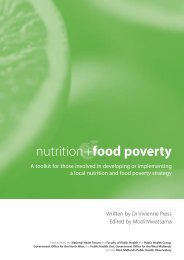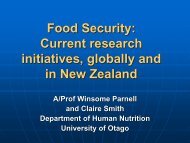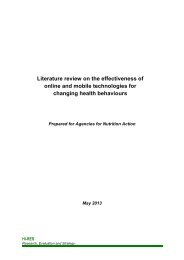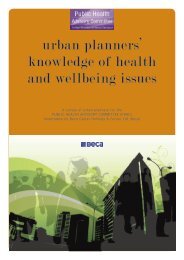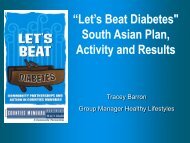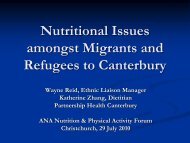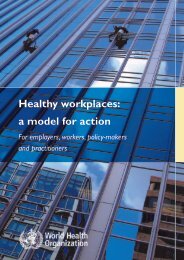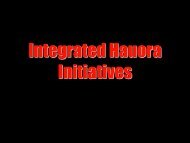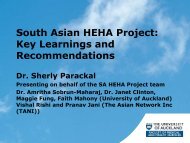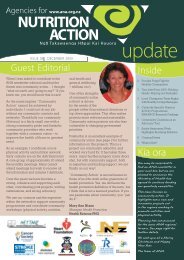enhancing food security and physical activity for maori, pacific and ...
enhancing food security and physical activity for maori, pacific and ...
enhancing food security and physical activity for maori, pacific and ...
- No tags were found...
Create successful ePaper yourself
Turn your PDF publications into a flip-book with our unique Google optimized e-Paper software.
Enhancing Food Security <strong>and</strong> Physical Activity <strong>for</strong> Māori, Pacific <strong>and</strong> Low-income Peoplesconsidered beneficial to adults' long-term health care. Research shows that GRx is aninexpensive way of increasing <strong>activity</strong> <strong>for</strong> inactive people. 27In 2004, the GRx programme was extended to better target the needs of young people<strong>and</strong> their families. This resulted in the GRx Active Families (GRxAF) initiative, whichnow operates in eight regions. The GRxAF programmes are designed to increase<strong>physical</strong> <strong>activity</strong> in children <strong>and</strong> young people aged 5-18 years of age <strong>and</strong> theirwhānau/families, <strong>and</strong> are there<strong>for</strong>e more likely to appeal to Māori <strong>and</strong> Pacificcommunities. The aim of GRxAF is to decrease body mass by enabling families toembrace healthier <strong>and</strong> more active lifestyles that are sustainable, throughencouragement <strong>and</strong> education, nutritional guidance <strong>and</strong> advice, realistic goal setting <strong>and</strong>ongoing support. Regular group <strong>activity</strong> sessions are held at community facilities <strong>and</strong>include goal setting <strong>and</strong> review, nutrition advice, a <strong>physical</strong> <strong>activity</strong> session, <strong>and</strong> workingas a group on individual goals/achievements. Physical activities include fitness circuits,modified games, sports <strong>and</strong> aquatic activities. In<strong>for</strong>mation <strong>and</strong> education about health,well-being <strong>and</strong> <strong>physical</strong> <strong>activity</strong> is provided.Waitemata District Health Board (WDHB) has provided funding <strong>for</strong> the development ofMāori <strong>and</strong> Pacific-specific Active Families programmes. These programmes arecoordinated respectively by Māori <strong>and</strong> Pacific providers who recruit participants <strong>and</strong>deliver the intervention. Each culturally-specific programme is underpinned <strong>and</strong>supported by their respective steering groups. An independent qualitative <strong>and</strong>quantitative evaluation 28 has been commissioned by SPARC <strong>and</strong> the WDHB, withresults available by December 2009.GRxAF Otara South Auckl<strong>and</strong>Health Incorporated is a not-<strong>for</strong>-profit, st<strong>and</strong>-alone organisation that has been operating<strong>for</strong> ten years in the Otara, South Auckl<strong>and</strong> community <strong>and</strong> has been delivering GRxAFsince 2007. The programme has been modified in consultation with the Māori <strong>and</strong> Pacificcommunities <strong>and</strong> utilises a whānau approach to improve <strong>physical</strong> <strong>activity</strong> <strong>and</strong> healthynutrition. A programme evaluation, including in<strong>for</strong>mation from focus groups with families,is due <strong>for</strong> completion in June 2009.Obesity Prevention in Communities (OPIC) <strong>and</strong> Let’s Beat Diabetes (LBD)Two large multi-component interventions (Obesity Prevention in Communities <strong>and</strong> LetsBeat Diabetes) have been implemented in NZ to reduce obesity <strong>and</strong> diabetes amongMāori <strong>and</strong> Pacific populations. While these interventions target Māori <strong>and</strong> Pacific people,they have also incorporated the development of culturally-specific <strong>physical</strong> <strong>activity</strong>initiatives.Obesity Prevention in Communities (OPIC)The OPIC project is part of a regional collaboration involving Deakin University(Australia), Fiji School of Medicine, the Tongan Ministry of Health <strong>and</strong> the University ofAuckl<strong>and</strong>. OPIC was based on a youth participation model which involved young peopleinitiating <strong>and</strong> developing interventions within their school environments to improve<strong>physical</strong> <strong>activity</strong> <strong>and</strong> nutrition. For <strong>physical</strong> <strong>activity</strong> several initiatives were developed,including breakfast clubs in which students were able to sign-out sporting equipment <strong>for</strong>use during lunches <strong>and</strong> recess, breakfast clubs with opportunity to practice hip-hop <strong>and</strong>play games, <strong>and</strong> after-school dance classes. Preliminary results of the OPIC study wereavailable in July 2009.176



